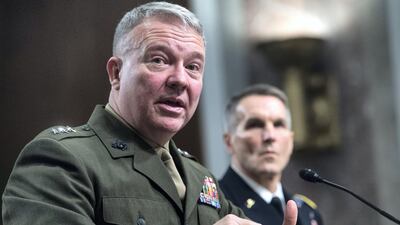The US has completed about half of its withdrawal from Afghanistan and remains on track to meet the September 11 deadline to quit the battered country and bring to an end America’s longest war, Gen Frank McKenzie said on Monday.
The head of the US military’s Central Command said the coming months would be critical for Afghanistan’s future and urged the Afghan government and the Taliban to resume long-stalled talks in Doha.
“We’ve completed about half of the entire retrograde process and we will meet the September deadline to complete the full withdrawal from Afghanistan,” Gen McKenzie said in a call with Middle East-based reporters.
“We are on pace and it is continuing very smoothly,” he added.
He said the US would maintain an embassy in Kabul for as long as the Afghan government wanted it there, repeating the Pentagon’s vow to continue supporting the Afghan security forces and to conduct counter-terrorism operations from “over the horizon” – or overseas.
President Joe Biden announced in April that all US troops would depart Afghanistan by September 11, the 20th anniversary of the 9/11 attacks that triggered the US-led invasion of the country later that year.
Mr Biden has faced broad criticism for following through on his predecessor Donald Trump’s plan to end the war this year, with observers worried the withdrawal will serve as a green light for the Taliban to seek total control of Afghanistan, sweeping away the fragile freedoms that women and minority groups have gained since the hard-line group's removal in 2001.
The US has spent more than $2 trillion on the war in Afghanistan, including on nation-building projects and veteran care, and more than 2,400 American soldiers have been killed there.
Nato partners – many of whom have been in Afghanistan since 2001 – will also leave the country.
The Taliban have already said they will not continue negotiations that started in Doha in September with the Kabul-based government until all foreign forces have pulled out.
Gen McKenzie said it was “critical” the two sides come together.
“As we pull out, there needs to be something political that’s left in place,” he said.
“The government of Afghanistan is willing to do that. I am not sure the Taliban [are] willing to do that. Now is the time, and unfortunately, time is now becoming very short.”
One looming question for Afghanistan is the fate of thousands of Afghan interpreters and auxiliary workers who were employed by foreign militaries, with many concerned they will be targeted by the Taliban for working for a foreign power.
US Secretary of State Antony Blinken said on Monday that the US was considering “every option” to help Afghan employees and vowed to expedite US immigration visas.
When asked whether the Pentagon might soon begin to evacuate vulnerable workers, McKenzie said: "We will have the capability to exercise whatever orders we’re given."
The four-star Marine general said another priority for the region under his watch was Iran and deterring its “destabilising” activity, which he described as the biggest threat to Middle East security.
“Our posture in the region has had a deterrent effect on Iran and made it more difficult for them to deny attribution for their malign activities,” Gen McKenzie said.
The general also said the Pentagon is continuing to work with Saudi Arabia on improving its integrated air and missile-defence systems.
“That’s a very high priority for us as it is for Saudi Arabia because they are subjected to, really, an unceasing bombardment from the Houthis in Yemen through ballistic missiles, small drones and land-attack cruise missiles,” he said.
“These attacks are not helpful. They are certainly not helpful in trying to find an end to the conflict in Yemen and so we work very hard with the Saudis to enable them to defend themselves.”















